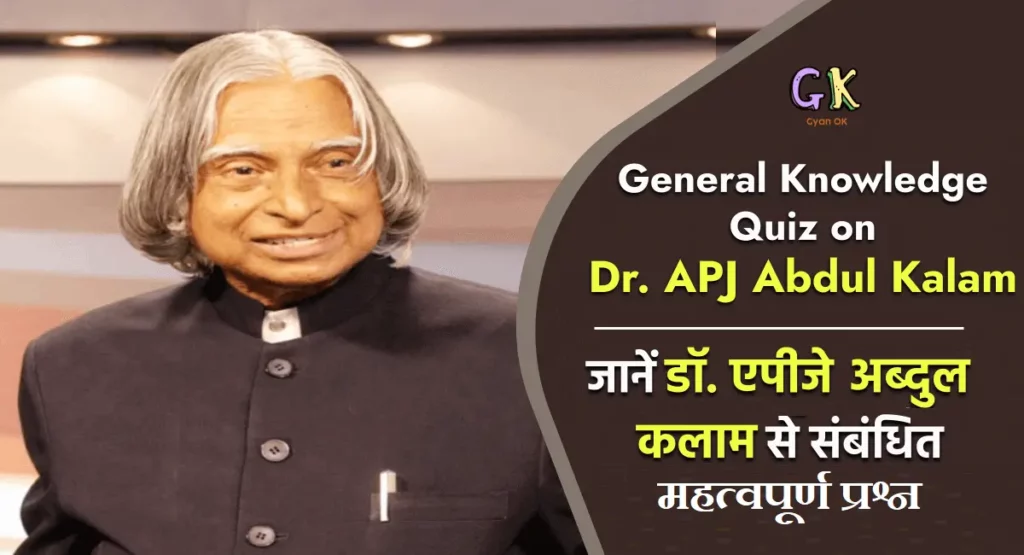Dr. A.P.J. Abdul Kalam, fondly known as the “People’s President” and the “Missile Man of India,” was a visionary scientist and the 11th President of India. His life story is one of humble beginnings, remarkable achievements in space and missile technology, and a deep commitment to inspiring India’s youth. To celebrate his legacy and inspire others, we’ve crafted a quiz that explores the life and contributions of Dr. Kalam. Join us in discovering the extraordinary journey of this remarkable leader.

General Knowledge Quiz on APJ Abdul Kalam
Dr. A.P.J. Abdul Kalam’s sharp intellect and visionary leadership were instrumental in India’s scientific advancements, particularly in space and missile technology. His tenure as President from 2002 to 2007 was marked by a focus on youth empowerment and education, inspiring millions of young Indians to pursue careers in science and technology. His contributions to India’s space and defence programs continue to shape the nation’s progress and technological achievements.
Following we have prepared a quiz dedicated to Dr. APJ Abdul Kalam, The objective of this quiz is for self-assessment and to help you learn something through the activity.
[–MCQ-QUESTIONS-DISPLAY–]
About Dr. APJ Abdul Kalam
Dr. Avul Pakir Jainulabdeen Abdul Kalam, known affectionately as “Missile Man” and “People’s President,” was one of India’s most beloved and revered figures. Born on October 15, 1931, in Rameswaram, Tamil Nadu, he rose from humble beginnings to become a prominent scientist, visionary leader, and India’s 11th President.
Kalam’s early life was marked by hardship and financial struggles. He came from a modest background, and his parents encouraged him to pursue education. His determination and thirst for knowledge led him to excel in academics. After completing his studies in aerospace engineering at the Madras Institute of Technology, he joined the Defense Research and Development Organization (DRDO).
Kalam’s journey as a scientist took a significant turn when he joined the Indian Space Research Organization (ISRO) in 1969. His work in ISRO and later at the DRDO was marked by groundbreaking achievements in missile technology and space exploration. He played a pivotal role in the development of India’s first indigenous satellite launch vehicle (SLV-III) and the Agni and Prithvi missiles, earning him the title “Missile Man of India.”
One of Kalam’s most notable accomplishments was the successful launch of the Rohini Satellite in 1980, marking India’s entry into the space age. His contributions to India’s defense capabilities, particularly the successful test-firing of the Agni missile, solidified his reputation as a brilliant scientist and technologist.
Beyond his scientific endeavors, Dr. Kalam was a visionary leader who believed in harnessing science and technology for the benefit of society. He championed the importance of science education and research and sought to inspire young minds. His book, “Wings of Fire: An Autobiography,” detailed his life’s journey and served as an inspirational guide for countless aspiring students and professionals.
Dr. Kalam’s exemplary service to the nation was recognized when he was appointed as the 11th President of India in 2002. He became the first scientist and bachelor to hold the highest office in the country. During his tenure as President, he continued to inspire and connect with people, particularly the youth, through his speeches and interactions.
Kalam’s presidency was marked by his commitment to education, innovation, and youth empowerment. He launched initiatives like “Providing Urban Amenities to Rural Areas” (PURA) to improve living conditions in rural India. His dedication to fostering scientific and technological advancements, along with his humility and approachability, endeared him to people from all walks of life.
On July 27, 2015, while delivering a lecture at the Indian Institute of Management Shillong, Dr. A.P.J. Abdul Kalam suffered a cardiac arrest and passed away. His death was met with an outpouring of grief and tributes from across India and the world. He left behind an enduring legacy as a scientist, leader, and inspiration to millions.
